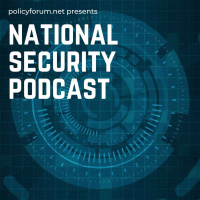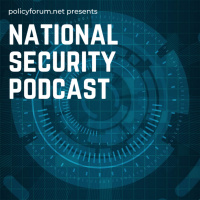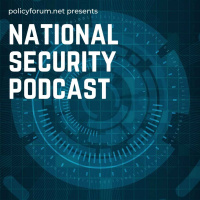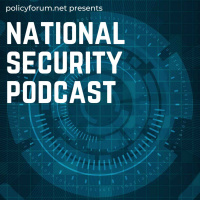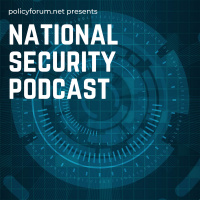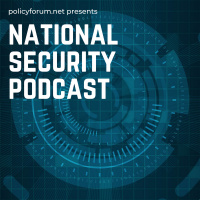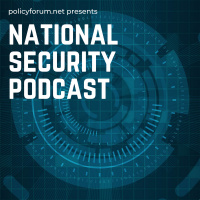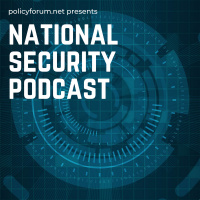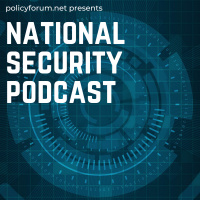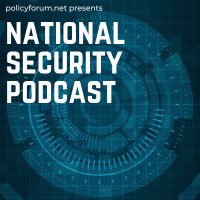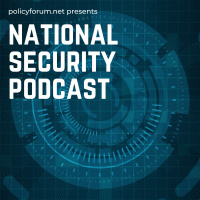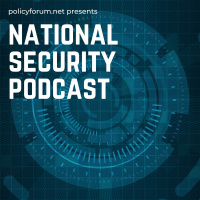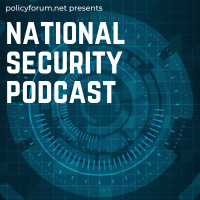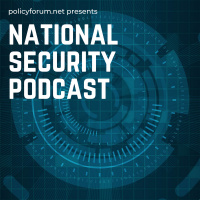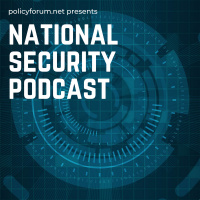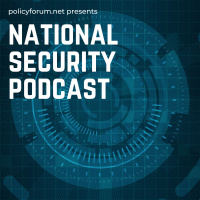Sinopsis
Chris Farnham and Katherine Mansted bring you expert analysis, insights and opinion on Australia and the region's national security challenges in this pod from Policy Forum. Produced with the support of the ANU National Security College.
Episodios
-
Quad Tech Network – A techno-diplomacy strategy for telecommunications in the Indo-Pacific
04/11/2021 Duración: 57minIn this episode of the National Security Podcast, Head of ANU National Security College Professor Rory Medcalf and Director of ANU Tech Policy Design Centre Johanna Weaver join Lisa Curtis and Martijn Rasser from the Center for New American Security to discuss their recent paper, A Techno-Diplomacy Strategy for Telecommunications in the Indo-Pacific.In this special event recording, Professor Rory Medcalf and Johanna Weaver are joined by Lisa Curtis and Martijn Rasser from the Center for New American Security to discuss their recent paper, A Techno-Diplomacy Strategy for Telecommunications in the Indo-Pacific. They argue that the Quad has an opportunity to shape the telecommunications ecosystem in the Indo-Pacific so that key 5G and undersea cable infrastructure are more secure, resilient, and open. Lisa and Martijn recommend that a concrete techno-diplomatic strategy – developed in partnership between Australia, the United States, India, and Japan – will be key to ensuring that the future of the Indo-Pacific
-
Senator Jenny McAllister on intelligence oversight and diversity in national security
27/10/2021 Duración: 34minIn this episode of the National Security Podcast, Head of the ANU National Security College Professor Rory Medcalf is joined in conversation by Senator Jenny McAllister, in her first interview since being appointed as Deputy Chair of the Parliamentary Joint Committee on Intelligence and Security.Professor Rory Medcalf and Senator Jenny McAllister discuss her work as the Deputy Chair of the powerful Parliamentary Joint Committee on Intelligence and Security, her pursuit of new intelligence oversight powers for the committee, and its inquiry into critical infrastructure. In the discussion, Senator McAllister reflects on the security of the upcoming federal election, the role of state governments in Australia’s national security, and the need for intelligence and security agencies to reflect the diversity of the communities they serve. Professor Medcalf and Senator McAllister also talk about Dr William Stoltz’s recent argument for a Minister for Intelligence and important research on Women in International
-
Quad Tech Network – How to secure battery value chains
14/10/2021 Duración: 01h08sIn this special event recording, Jeffrey Wilson joins Rory Medcalf and Jennifer Jackett to explore the ideas put forward in his recent paper from the Quad Tech Network’s QTN series. Batteries are a critical technology to support the energy transition necessary for adapting to climate change. However, the global value chains that produce them are insecure. The ‘Quad’ governments – Australia, Japan, India, and the United States – all recognise the need for secure battery value chains but have yet to align their battery strategies. Dr Jeffrey Wilson, Research Director at the Perth USAsia Centre, suggests that a Quad battery partnership should be developed to secure this critical twenty-first century technology. In this special event recording, he is joined in conversation by Head of the ANU National Security College Professor Rory Medcalf and Sir Roland Wilson Scholar Jennifer Jackett to expand upon the analysis and recommendations put forward in his recent paper from the Quad Tech Network’s QTN series
-
Balancing acts: unpacking Australia’s electronic surveillance law
06/10/2021 Duración: 34minIn this episode of the National Security Podcast, Lizzie O’Shea and Dominique Dalla-Pozza join Will Stoltz to discuss the state of electronic surveillance in Australia – with a focus on two new powerful pieces of legislation.Large parts of our lives are now conducted online, so naturally this domain has become an import source of intelligence and evidence for national security agencies. Parliament recently passed two important pieces of legislation that expand the powers of Australia’s security agencies to spy digitally. What impact will these laws have on the average citizen? And how will they help security agencies do their jobs? In this episode of the National Security Podcast, Will Stoltz chats to Lizzie O’Shea and Dominique Dalla-Pozza about these new laws and what impact they might have.Lizzie O’Shea is a human rights lawyer specialising in public interest litigation. She is a founding member and Chair of Digital Rights Watch and the author of Future Histories.Dr Dominique Dalla
-
Tom Tugendhat MP on the AUKUS “ménage à trois”
23/09/2021 Duración: 50minIn this episode of the National Security Podcast, Chair of the British Parliament’s Foreign Affairs Committee Tom Tugendhat joins Rory Medcalf to unpack what the AUKUS arrangement could mean for the future of the Indo-Pacific.It’s not quite an alliance, it’s not formally a treaty, but AUKUS is certainly a striking alignment of nations. The question is: what impact will it have beyond the initial nuclear submarines arrangement? And can the damage done to Australia’s standing with France – a key Indo-Pacific partner – be repaired? Tom Tugendhat MP joins Professor Rory Medcalf to share a UK perspective on these questions and more. This discussion builds on a recent publication by Mr Tugendhat on Australia-United Kingdom security ties.Tom Tugendhat is the Conservative MP for Tonbridge and Malling in the United Kingdom and has been Chair of the British Parliament’s Foreign Affairs Committee since 2017. Before becoming an MP, Tom was in the British Army and served in both Iraq and Afghanistan.Professor Rory Me
-
Understanding Australia – the vital role played by the National Archives with Director-General David Fricker
09/09/2021 Duración: 54minIn this episode of the National Security Podcast, David Fricker, Director-General of the National Archives of Australia, joins two of the ANU National Security College’s resident historians — Dr William Stoltz and Associate Professor Sue Thompson – to talk about the vital role played by the National Archives.Are the collections of the National Archives of Australia national security infrastructure? After almost a decade of leading the organisation, Director-General David Fricker certainly believes so. If they were destroyed, made inaccessible or manipulated, it would severely undermine faith in Australia’s national values, he argues on the National Security Podcast. In this episode, the Director-General — along with Dr William Stoltz and Associate Professor Sue Thompson — explore the vital role the National Archives plays in Australian life, what makes it unique amongst its international peers, the challenge of balancing secrecy with transparency, and much more.Dr William Stoltz is the Senior Adviser for
-
Indo-Pacific Futures – Geoeconomics
01/09/2021 Duración: 48minIn this episode of the National Security Podcast, the third instalment of our special three-part Indo-Pacific Futures series, we explore two key geoeconomics trends in the region.In this episode of the National Security Podcast, we look at the rise of geoeconomics and what it means for the future of regional security. In particular, the program explores supply chain security and economic decoupling as two key geoeconomic trends in the Indo-Pacific and consider how they might play out in coming decades. Economists, strategic thinkers, researchers, and people with policy-making experience join us to define these issues, help us think about what they look like today, and discuss where they may go in years to come.Dr Jeffrey Wilson is the Research Director at the Perth USAsia Centre.Dr Xue Gong is Assistant Professor in the China Programme at the S. Rajaratnam School of International Studies at the Nanyang Technological University, Singapore.Helen Mitchell is a Sir Roland Wilson PhD Scholar at The Australian Nati
-
High Commissioner to Australia HE Manpreet Vohra on the future of India’s role in the world
13/08/2021 Duración: 42minIn this episode of the National Security Podcast, India’s High Commissioner to Australia — His Excellency Manpreet Vohra — sits down with Professor Rory Medcalf in the latest instalment of the Security Summit series.As the world’s largest democracy and one of the fastest growing major economies, what does the future hold for India in an age of great power competition? And with pre-pandemic migration making the Indian diaspora Australia’s fastest growing migrant community, how will the relationship evolve in years to come? On the eve of India’s Independence Day, Professor Rory Medcalf interviews His Excellency Manpreet Vohra, India’s newly appointed High Commissioner to Australia, to explore India’s role in the Indo-Pacific, the growing India-Australia relationship, and how closer strategic collaboration between the two nations can be achieved. His Excellency Manpreet Vohra commenced as India’s High Commissioner to Australia in April 2021. He joined the Indian Foreign Service in 1988 and since then has be
-
Indo-Pacific Futures – Critical technology
21/07/2021 Duración: 36minIn this episode of the National Security Podcast, the second instalment of our special three-part series looking at key trends influencing the future strategic landscape of the Indo-Pacific, we consider the technologies that have become critical to national security and how they’re going to shape the region over the coming decades.Technology has been part of human life since shale was shaped to cut animal hide. Things have come a long way since stone was the leading edge of innovation. In this episode of the National Security Podcast, we speak to a number of scientists, researchers, strategic thinkers and analysts to find out what technologies they are working on and the ones that they think could plausibly influence the future strategic landscape.Jennifer Jackett is a Sir Roland Wilson Scholar in the National Security College at The Australian National University.Professor Claudia Vickers is leads the Synthetic Biology Future Science Platform at the Commonwealth Scientific and Industrial Research Organisatio
-
Tim Watts MP on national identity and cyber literacy in Australia
07/07/2021 Duración: 52minIn this episode of the National Security Podcast, Tim Watts, Shadow Assistant Minister for Cyber Security and Communications, joins Rory Medcalf for the latest instalment of our Security Summit series.With cyber-enabled threats on the rise, including ransomware attacks, cyber espionage, and disinformation campaigns, how can Australia increase its cyber resilience and literacy? In this episode of the National Security Podcast, we host federal Labor Member for Gellibrand and Shadow Assistant Minister for Cyber Security and Communications Tim Watts MP to discuss the benefits of a strong sense of national identity to sustaining social cohesion and resilience, Australia’s cyber security literacy, and the unique ways change can be achieved while working from opposition.Tim Watts MP is the Shadow Assistant Minister for Cyber Security and Communications and the Federal Labor Member of Parliament representing the seat of Gellibrand. Professor Rory Medcalf is Head of the National Security College at The Australian
-
Indo-Pacific Futures – The grey zone, hybrid war, and minilateralism
17/06/2021 Duración: 57minIn this episode of the National Security Podcast, we bring you the first of a special three-part series looking at key trends influencing the future strategic landscape of the Indo-Pacific. This episode unpacks two competing trends that are shaping the regional order: the rise of grey zone and hybrid threats, and the emergence of ‘minilateralism’.Grey zone and hybrid threats have been rising in prominence as tools used by authoritarian states as they attempt to reshape the regional order. But what are they, who are they being used against, and how they are likely to evolve in coming years? And with minilateralism emerging as a preferred format for states to meet the challenges of great power competition, how might diplomacy evolve to match the shifting security landscape of the coming decade? In this episode of the National Security Podcast, we ask how these trends intersect and whether minilateralism is an effective tool to deal with grey zone and hybrid threats.Professor Sascha
-
Avoiding a space race to the bottom: Australia as a ‘middle space power’
09/06/2021 Duración: 01h02minIn this episode of the National Security Podcast, Mission Specialist at the ANU Institute for Space Dr Cassandra Steer, CEO of the Space Industry Association of Australia James Brown, and Visiting Fellow at ANU National Security College Katherine Mansted join Dayle Stanley to interrogate the opportunities and risks presented to Australia as a ‘middle space power’.Space is a critical strategic domain for Australia’s civilian and military interests but is increasingly congested, contested, and competitive. Major powers are engaged in a destabilising space arms race – China, Russia, and the United States have rejected the strategic restraint that kept space a stable political and military domain. As a ‘middle space power’, Australia has the capacity to encourage responsible behaviour in space. In this episode of the National Security Podcast, ANU National Security College brings you a panel discussion between Dr Cassandra Steer, James Brown, Katherine Mansted, and Day
-
Audiopaper | New Indo-Pacific partnership: building Australia-Bangladesh security ties
03/06/2021 Duración: 20minThis episode of the National Security Podcast brings you an audiopaper from the Policy Options Paper series, the flagship publication of ANU National Security College. New Indo-Pacific partnership: Building Australia-Bangladesh security ties is authored by David Brewster, Senior Research Fellow at ANU National Security College. As part of its Indo-Pacific strategy, Australia needs to broaden its engagement in South Asia. For at least a decade, Australia has rightly concentrated on its partnership with India, but it is now time to broaden that strategy to include other countries in that region. Bangladesh should be an important part of that new focus. With its thriving economy and a population of more than 160 million, it has the potential to become the next ‘Asian tiger’. In this Policy Options Paper, David Brewster argues the case for why Australia should develop its defence and security relationship with Bangladesh as part of broader political and economic engagement, and outlines how this could be ach
-
The next ‘Asian tiger’: building Australia-Bangladesh security ties
02/06/2021 Duración: 41minIn this episode of the National Security Podcast, ANU National Security College Senior Research Fellow Dr David Brewster and Ric Smith – former Australian Ambassador to China and Indonesia and Secretary of Defence – join Professor Rory Medcalf to explore what a deeper Australia-Bangladesh security relationship should look like.As part of its Indo-Pacific strategy, Australia needs to broaden its engagement in South Asia. For at least a decade, Australia has rightly concentrated on its partnership with India, but it is now time to broaden that strategy to include other countries in that region. Bangladesh should be an important part of that new focus. With its thriving economy and a population of more than 160 million, it has the potential to become the next ‘Asian tiger’. In this episode of the National Security Podcast, Dr David Brewster and former Australian Ambassador to China and Indonesia Ric Smith join Professor Rory Medcalf to discuss why Australia should develop its defence and security relationship wi
-
Audiopaper | Australia as a space power: combining civil, defence, and diplomatic efforts
28/05/2021 Duración: 21minThis episode of the National Security Podcast brings you an audiopaper from the Policy Options Paper series, the flagship publication of the ANU National Security College. Australia as a Space Power: Combining Civil, Defence, and Diplomatic Efforts is authored by Cassandra Steer – Senior Lecturer at the ANU College of Law and Mission Specialist at the ANU Institute for Space (InSpace).Space is a critical strategic domain for Australia’s civilian and military interests but is increasingly congested, contested and competitive. Major powers are engaged in a destabilising space arms race – China, Russia, and the United States have rejected the strategic restraint that kept space a stable political and military domain. As a ‘middle space power’, Australia has the capacity to encourage responsible behaviour in space.This episode of the National Security Podcast brings you an audiopaper from the Policy Options Paper series – the flagship publication of the ANU National Security College.
-
Australia’s Ambassador for Cyber Affairs and Critical Technology on a values-based approach to tech diplomacy
19/05/2021 Duración: 48minIn this episode of the National Security Podcast, the latest in our Security Summit series, Tobias Feakin – Australia’s Ambassador for Cyber Affairs and Critical Technology – joins Professor Rory Medcalf to unpack the government’s recently-launched International Cyber and Critical Tech Engagement Strategy.Cyber and critical technology are at the centre of geostrategic competition in the 21st century and affect all aspects of international relations. They affect Australia’s national security, economic prosperity, the protection and realisation of human rights and freedoms, sustainable development, and international peace and stability. The new Strategy sets out the government’s goal for a peaceful, stable and prosperous Australia, Indo-Pacific region, and world and provides a framework to guide the whole-of-government international engagement across the broad spectrum of cyber and critical technology issues guided by three pillars: values, security, and prosperity. In this National Security Podcast, Austr
-
Audiopaper | Protecting education exports: minimising the damage of China’s future economic coercion
14/05/2021 Duración: 20minThis episode of the National Security Podcast brings you an audiopaper from the Policy Options Paper series — the flagship publication of the ANU National Security College. Protecting Education Exports: Minimising the damage of China’s future economic coercion is authored by Dirk van der Kley and Benjamin Herscovitch — Research Fellows at the ANU School of Regulation and Global Governance.Coercion against Australia’s education sector would significantly impact the country’s prosperity. Education is the nation’s only remaining export to China valued over $10 billion annually which is both reliant on China and which Beijing can target without significant self-harm. And unlike many industries currently subject to China’s economic coercion, education is job-intensive and closely linked to Australia’s technological competitiveness. The Australian Government has no mechanism to coordinate efforts to diversify education export markets or cohesively promote Australian educ
-
How Australia can protect its education exports from China
11/05/2021 Duración: 55minIn this episode of the National Security Podcast, Dirk van der Kley and Benjamin Herscovitch — Research Fellows at ANU School of Regulation and Global Governance — join Chris Farnham to discuss how Australia can protect its education exports from potential economic coercion from China.Coercion against Australia’s education sector would significantly impact the country’s prosperity. Education is Australia’s only remaining export to China valued at over $10 billion annually that the Chinese Government could target without significant self-harm. And, unlike many industries currently subject to China’s economic coercion, education is job-intensive and closely linked to Australia’s technological competitiveness. The Australian Government has no mechanism to co-ordinate efforts to diversify education export markets or cohesively promote Australian education – this makes the sector more exposed to coercion. In this episode of the National Security Podcast, researchers Dirk van der Kley and Benjamin Herscov
-
Re-thinking Australian science policy in a changed world
21/04/2021 Duración: 43minIn this episode of the National Security Podcast, Paul Harris — Adjunct Fellow at the Center for Security and Emerging Technology at Georgetown University — joins Katherine Mansted to discuss the need to re-think how the Australian science system engages with the rest of the world and delivers value to the nation.The global science and technology system has undergone massive change since 2000 and is now a key site of geoeconomic competition between states. For the first time in Australia’s history, its most significant partner for science collaboration will be a country other than our principal ally, the United States. Australia’s successful model for science has relied upon uncommonly high levels of international engagement, but in this new world that model also brings new risks. There is a need to systematically re-think how the Australian science system engages with the rest of the world and delivers value to the nation.In this episode of the National Security Podcast, Paul Harris — Adjunct
-
Audiopaper | Clever country in a changed world: re-thinking Australian science policy
21/04/2021 Duración: 19minThis episode of the National Security Podcast brings you the first-ever audiopaper from the ANU National Security College’s flagship publication, the Policy Options Paper series. Clever Country in a Changed World: Re-Thinking Australian Science Policy is authored by Paul Harris — Adjunct Fellow at the Center for Security and Emerging Technology at Georgetown University — and is presented by Katherine Mansted, Series Editor and Senior Adviser for Public Policy at the ANU National Security College.The global science and technology system has undergone massive change since 2000 and is now a key site of geoeconomic competition between states. For the first time in Australia’s history, its most significant partner for science collaboration will be a country other than its principal ally, the United States. Australia’s successful model for science has relied upon uncommonly high levels of international engagement, but in this new world that model also brings new risks. There is a need to systematical


